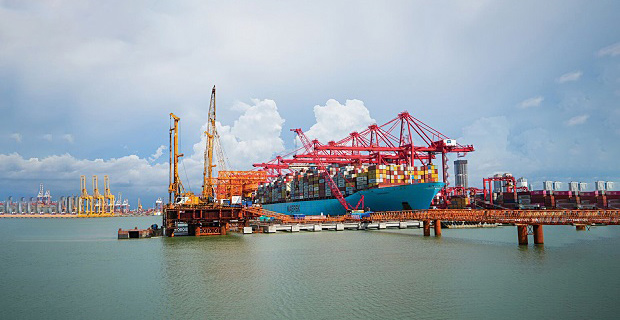US JOINS ADANI AT COLOMBO PORT
Colombo: The US has joined the Adani Group with a half a billion dollar loan to build a new deep water shipping container terminal at the strategic Colombo Port in the race against China’s acquisition of part of ports in the Sri Lankan capital and the southern town of Hambantota.
The US International Development Finance Corporation (DFC) in November announced its $553 million finance on the Colombo West International Terminal Private Limited (CWITP), Sri Lanka, the biggest foreign direct investment (FDI) of $750 million to develop the port.
The US has joined in the joint venture between Sri Lanka and India with Adani Ports & Special Economic Zones Limited (APSEZ) which owns 51 shares of the project. “DFC works to drive private-sector investments that advance development and economic growth while strengthening the strategic positions of our partners. That’s what we’re delivering with this infrastructure investment in the Port of Colombo,” DFC CEO Scott Nathan said while announcing the partnership in Colombo.
“Sri Lanka is one of the world’s key transit hubs, with half of all container ships transiting through its waters. DFC’s commitment of $553 million in private-sector loans for the West Container Terminal will expand its shipping capacity, creating greater prosperity for Sri Lanka -- without adding to sovereign debt -- while at the same time strengthening the position of our allies across the region,” Nathan added.
In addition to APSEZ, CWITP is composed of Sri Lanka’s John Keells Holdings which owns 34 per cent shares of the build, operate and transfer (BOT) basis project that is to run for a period of 35 years. The state-run Sri Lanka Ports Authority (SLPA) will have 15 percent of the total shares.
“We welcome the associate of the DFC in funding the Adani’s project. We see this as reaffirmation by the international community of our vision of our capability and our governance. This is the largest single FDI into Sri Lanka through a single project,” Karan Adani, APSEZ’s Whole Time Director and CEO, said at the event in Colombo.
“The relationship between Sri Lanka, the US and India is multifaceted and holds great promise. It symbolises the intersection of economic interests, regional stability and global security. Today is a historic day for all of us and today is a day that celebrates the deep historical and cultural and socio-economic bonds between two Asian neighbours Sri Lanka and India.
“Today is also a day we see the US- India relationship grow in strength and breath. I see this project as a first step through which three countries can foster cooperation and the development of sustainable infrastructure like smart and green ports which will improve the efficiency of port operation and also align with global efforts to combat climate change,” he added.
On her part, the US Ambassador to Sri Lanka Julie Chung said: “The $553 million investment by DFC for the long-term development of the Port of Colombo’s West Container Terminal will facilitate private- sector-led growth in Sri Lanka and attract crucial foreign exchange inflows during its economic recovery.
“This financing is symbolic of the US’ long-standing commitment to the development and well-being of the people of Sri Lanka. Sri Lanka regaining its economic footing will further our shared vision for a free and prosperous Indo-Pacific.”
The Port of Colombo is the largest and busiest trans-shipment port in the Indian Ocean and it has been operating at more than 90 percent utilization since 2021, signaling its need for additional capacity. The new terminal will cater to growing economies in the Bay of Bengal, taking advantage of Sri Lanka’s prime position on major shipping routes and its proximity to these expanding markets, the US Embassy said in a statement.
Once completed, the CWIT will be the biggest and deepest container terminal in Sri Lanka and will be equipped to handle ultra large container vessels with capacities of 24,000 TEUs. The annual cargo handling capacity of this new terminal is likely to exceed 3.2 million tons.











Comments.